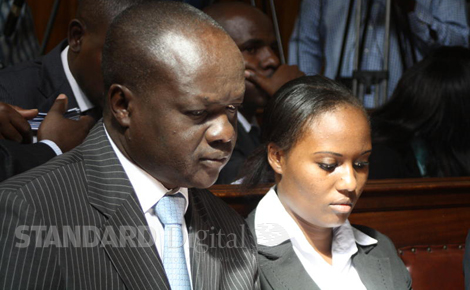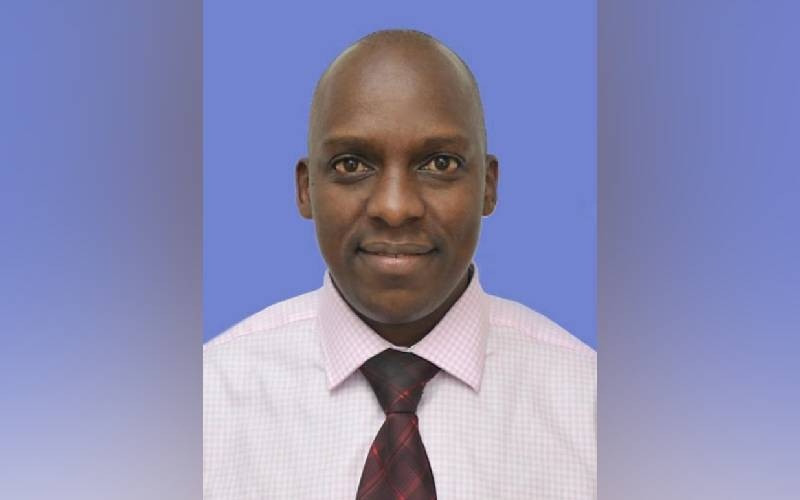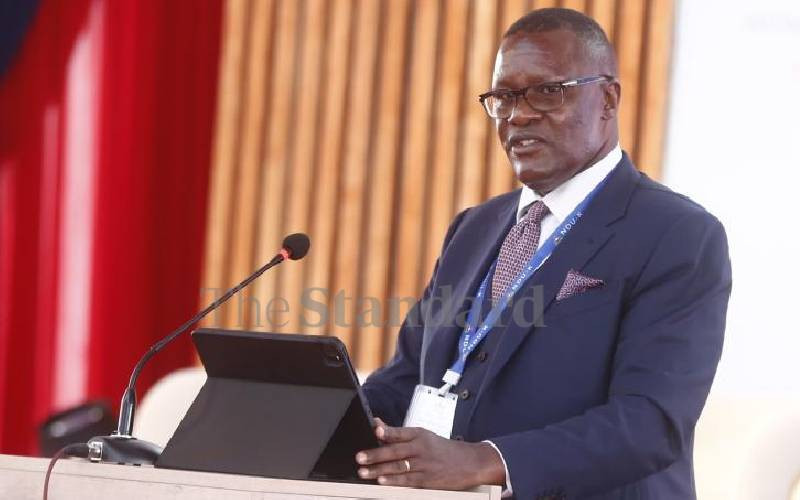 |
| Standard Group CEO Sam Shollei at the Supreme Court Wednesday during the mention of a case pitting Communications Authority of Kenya against three media houses over digital migration. [Photo: WILLIS AWANDU/STANDARD] |
NAIROBI: Communications Authority of Kenya (CA) defied Supreme Court orders given on September 29 last year to issue three media houses with a Broadcast Signal Distribution (BSD) licence and frequencies to enable them migrate to the digital platform.
According to lawyers Paul Muite, Issa Mansur and Kiragu Kimani, representing Africa Digital Network (ADN) - a consortium of Standard Group, Nation Media Group and Royal Media Services - the regulator backtracked in the last minutes of talks and withdrew the authorisation it had issued on November 25, 2014.
CA revoked the temporary licence (Self Provisioning Licence) and withdrew frequencies that were to be used to make set-top boxes.
The lawyers argued that the act was in contempt of the court, which had directed that they should dialogue and come up with a solution within 90 days.
“There has never been compliance on the side of CA until today (yesterday). Look at the documents we have filed and you will see that far from complying with the court orders, CA engaged a reverse gear. We don’t have the licence or the frequencies,” Mr Muite said.
The seven-judge bench, composed of justices Willy Mutunga, Kalpana Rawal, Phillip Tunoi, Mohammed Ibrahim, Jackton Ojwang, Smokin Wanjala and Njoki Ndung’u, heard that the whole dialogue process was surrounded by frustration as CA had a set mind that would not allow the two parties to agree on the tentative date for the analogue signal switch-off and issuing of a BSD licence.
“The withdrawal of the temporary authorisation and repossession of the allocated frequencies is draconian, unreasonable and patently unlawful,” ADN’s lawyers said, adding that CA had no basis for acting in such a manner.
However, CA maintained that it had complied with the orders but failed to tell the court that it had revoked the licence it had issued to the three media houses. The Francis Wangusi-led authority insisted it did its best to ensure a smooth transition.
ABDICATED DUTY
The media houses disputed this claim, saying the frequencies and the time given for them to be on the digital platform were unrealistic and biased as they could not cover the whole country and did not have the infrastructure to roll out their signals.
Muite said the three media houses had to go back to the Supreme Court as they were threatened with being switched off on December 30, 2014.
At this time, Muite said, the media houses could not have been ready to broadcast the digital signals as CA had issued them with the frequencies barely two weeks to the switch-off date.
CA on the other hand told the court the three media houses were already being carried by Startimes and GoTV under the must-carry rule thus they were still live across the country.
“The first applicant (CA) has abdicated its constitutional and statutory duty as a regulator and opted to be partisan by trying to compel the three media houses to be carried by its competitors. This is contrary to the Government policy of promoting and developing Kenyan broadcasters.
“CA has frustrated all attempts by the three media house to be licenced and facilitated to migrate to the digital broadcasting platform while at the same time bending over backwards to appease foreign-owned companies,” the court heard.
Stay informed. Subscribe to our newsletter
It also emerged that the switch-off date had not been agreed on contrary to the orders that CA would set a date for switch off following consultation and agreement with the media houses.
“There has been no consensus on the analogue switch-off date but the Cabinet made an announcement on November 27, 2014, that the switch off would be on December 30, 2014.
PROVISIONAL LETTER
“The date was imposed and unreasonable and fails to take into account the provisional letter of authorisation given in the same month on 25th,” Muite argued.
CA, through their lawyers Wambua Kilonzo and Fred Ojiambo, told the court there were consultative meetings between the parties and it had been agreed that the media houses would have the rest of the frequencies once the switch off took place.
Mr Ojiambo told the judges not to consider the events that happened (revoking of licence and withdrawal of frequencies) after the 90-day window given by the highest court in the land lapsed for dialogue.
 The Standard Group Plc is a
multi-media organization with investments in media platforms spanning newspaper
print operations, television, radio broadcasting, digital and online services. The
Standard Group is recognized as a leading multi-media house in Kenya with a key
influence in matters of national and international interest.
The Standard Group Plc is a
multi-media organization with investments in media platforms spanning newspaper
print operations, television, radio broadcasting, digital and online services. The
Standard Group is recognized as a leading multi-media house in Kenya with a key
influence in matters of national and international interest.
 The Standard Group Plc is a
multi-media organization with investments in media platforms spanning newspaper
print operations, television, radio broadcasting, digital and online services. The
Standard Group is recognized as a leading multi-media house in Kenya with a key
influence in matters of national and international interest.
The Standard Group Plc is a
multi-media organization with investments in media platforms spanning newspaper
print operations, television, radio broadcasting, digital and online services. The
Standard Group is recognized as a leading multi-media house in Kenya with a key
influence in matters of national and international interest.










